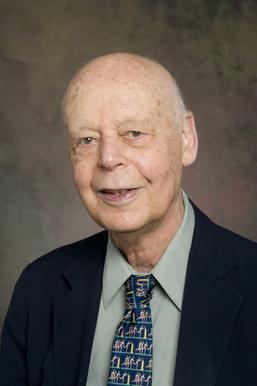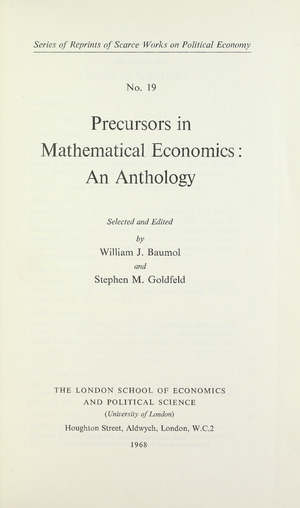William Baumol facts for kids
Quick facts for kids
William Baumol
|
|
|---|---|
 |
|
| Born |
William Jack Baumol
February 26, 1922 New York City, U.S.
|
| Died | May 4, 2017 (aged 95) New York City, U.S.
|
| Institution | |
| Field | Microeconomics, industrial organization, entrepreneurship |
| School or tradition |
Neo-Keynesian economics |
| Alma mater | College of the City of New York (B.Sc. 1942) London School of Economics (Ph.D. 1949) |
| Doctoral advisor |
Lionel Robbins |
| Doctoral students |
Lionel W. McKenzie William G. Bowen Burton Malkiel Harold Tafler Shapiro |
| Influences | Joseph Schumpeter Arthur Pigou John Maynard Keynes |
| Contributions | Baumol–Tobin model Baumol's cost disease Contestable market theory Sales revenue maximization model |
| Information at IDEAS / RePEc | |
William Jack Baumol (February 26, 1922 – May 4, 2017) was an important American economist. He taught economics at New York University and Princeton University. He was also a director at the Berkley Center for Entrepreneurship and Innovation.
Baumol wrote many books and articles about how the labor market and other economic factors affect our lives. He also studied entrepreneurship and the history of economic thought. Many experts consider him one of the most influential economists. He was recognized by important groups like the American Academy of Arts and Sciences.
Even though he was a top candidate for the Nobel Prize in Economics in 2003 and 2014, he passed away without receiving it.
Contents
William Baumol's Early Life
William Baumol was born in the South Bronx, a part of New York City. His parents, Solomon and Lillian, had moved to the U.S. from Eastern Europe.
He studied at the City College of New York and earned his bachelor's degree in 1942. After college, he served in the U.S. Army during World War II. Later, he worked as an economist for the Department of Agriculture.
His Education Journey
William Baumol first tried to join the doctoral program at the London School of Economics. He was initially accepted into the Master's program instead. However, after showing off his great debating skills, he was quickly moved to the doctoral program. He even became an Assistant Lecturer there!
Teaching Future Economists
While teaching at Princeton University, William Baumol guided many graduate students. Some of these students became very famous economists themselves. These included Burton Malkiel, William G. Bowen, and Harold Tafler Shapiro.
Key Research and Ideas
William Baumol developed many important economic ideas. Here are some of his well-known contributions:
- Contestable Markets: This theory suggests that even if there are only a few companies in a market, they might still act competitively. This happens if it's easy for new companies to enter and leave the market.
- Baumol-Tobin Model: This model helps explain how much money people choose to keep in cash. It looks at the costs of going to the bank versus the interest you could earn.
- Baumol's Cost Disease: This idea explains why costs in service industries, like healthcare or live performances, tend to rise over time. It's because it's harder to make these services more efficient.
- Sales Revenue Maximization: This model suggests that companies sometimes try to make as much money from sales as possible, not just the highest profit.
- Pigou Taxes: These are taxes designed to make people or companies pay for the negative effects they create, like pollution.
Baumol also helped change the field of finance. He studied how efficient capital markets are, how to choose the best investments, and how to plan for big projects.
Entrepreneurship and Innovation
William Baumol spent a lot of time studying entrepreneurship and new ideas. He looked at how disruptive innovations and creative entrepreneurs fit into traditional economic theories. In 2006, the American Economic Association held a special meeting to honor his work in this area.
The Baumol Research Centre for Entrepreneurship Studies in China is named after him. In 2003, he won the Global Award for Entrepreneurship Research. This award recognized his efforts to show how important entrepreneurs are in economics.
The Economist magazine wrote about Baumol's work on entrepreneurs. They noted that traditional microeconomic theory often didn't include entrepreneurs. Baumol helped fix this gap. His book, The Microtheory of Innovative Entrepreneurship, was the first formal study of innovative entrepreneurs.
Textbooks for Students
William Baumol wrote several economics textbooks. One popular book was Macroeconomics: Principles and Policy, which he wrote with Alan Blinder.
Interests and Giving Back
Baumol was a trustee for Economists for Peace and Security. He was also very interested in the economics of art, especially the performing arts. He studied how money works in theaters and music.
His Passing
William Baumol passed away on May 4, 2017, at the age of 95.
Selected Publications
William Baumol wrote many important papers and books. Here are a few examples of his work:
- Economic Dynamics, with R. Turvey, 1951.
- "The Transaction Demand for Cash: An inventory-theoretic approach", 1952, QJE.
- Welfare Economics and the Theory of the State, 1952.
- Business Behavior, Value and Growth, 1959.
- Economic Theory and Operations Analysis, 1961.
- Performing Arts: the economic dilemma, 1966.
- "Macroeconomics of Unbalanced Growth: The anatomy of urban crisis", 1967, AER.
- The Theory of Environmental Policy, with W.E.Oates, 1975.
- Contestable Markets and the Theory of Industry Structure, with J.C. Panzar and R.D. Wilig, 1982.
- Productivity and American Leadership: The long view, with S.A. Batey Blackman and E.N. Wolff, 1989.
- Entrepreneurship: Productive, Unproductive and Destructive, 1990.
- The Free Market Innovation Machine: Analyzing the Growth Miracle of Capitalism, 2002.
- Good Capitalism, Bad Capitalism, and the Economics of Growth and Prosperity, co-authored with Robert Litan and Carl J. Schramm, 2007.
- The Cost Disease: Why Computers get Cheaper and Health Care Doesn't, 2012.
Awards and Recognition
William Baumol received many honors throughout his career:
- He was President of the American Economic Association in 1981.
- He became a Fellow of the Econometric Society in 1953.
- He received honorary doctorates from several universities, including the London School of Economics and Princeton University.
- In 2003, he won the Global Award for Entrepreneurship Research.
See also
 In Spanish: William Baumol para niños
In Spanish: William Baumol para niños
- Baumol–Tobin model
- Baumol's cost disease
 | Janet Taylor Pickett |
 | Synthia Saint James |
 | Howardena Pindell |
 | Faith Ringgold |


